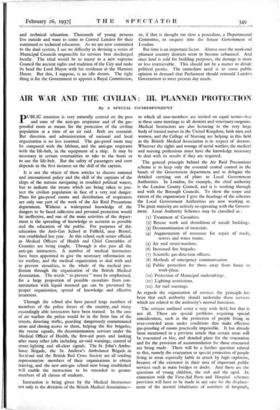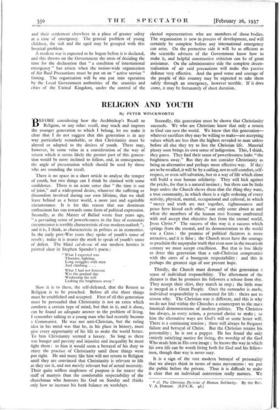AIR AN AR AND THE CIVILIAN : ILL PLANNED PROTECTION
By A SPECIAL CORRESPONDENT
PUBLIC attention is very naturally centred on the pros and cons of the anti-gas respirator and of the gas- proofed room as means for the protection of the civilian • population at a time of an air raid. Both are essential. But direction and administration of national and local organisation is no less essential. The gas-proof room may be compared with the lifeboat, and the anti-gas respirator with the life-belt, in the equipment of a ship. It may be necessary in certain eventualities to take to the boats or to use the life-belt. But the safety of passengers and crew depends in the first instance on the skill of the captain.
It is not the object of these articles to discuss national and international policy and the skill of the captains of the ships of the nations navigating in troubled political waters, but to indicate the means which are being taken to pro- - test the civilian population in face of a very real danger. Plans for gas-proof rooms and distribution of respirators are only one part of the work of the Air Raid Precautions department. Without a widespread knowledge of the dangers to be faced collective and personal protection would be ineffective, and one of the main activities of the depart- ment is the spreading of knowledge as accurate as possible and the education of the public. For purposes of this education the Anti-Gas School at Falfield, near Bristol, was established last year. At this school such senior officials as Medical Officers of Health and Chief Constables of Counties are being taught. Through it also pass all the anti-gas instructors. A number of medical instructors have been appointed to give the necessary information on 'air warfare, and the medical organisation to deal with and to prevent casualties, to the whole of the medical pro- fession throuih the organisation of the British Medical Association. - The words " to prevent " must be emphasised, for a large proportion of possible casualties from con- tamination with liquid mustard gas can be prevented by proper organisation, spread of knowledge and effective treatment.
Through the school also have passed large numbers of members of the police forces of the country, and many exceedingly able instructors have been trained. In the case of air warfare the police would be in the front line of the "streets, directing traffic, guarding dangerously contaminated areas and dosing access to them, helping the fire brigades, the rescue squads, the decontamination services under the Medical Officer of Health, the first-aid posts and looking after many other jobs including air-raid warnings, control of street lighting and all-clear signals. The St. John's Ambu- lance Brigade, the St. Andrew's Ambulance Brigade in Scctl ma and the British Red Cross Society are all sending representative members of their organisations to obtain training, and the new anti-gas school now being established will enable the instruction • to be extended to greater numbers of all classes of students.
Instruction is being given by the Medical Instructors not only to the divisions of the British Medical Association— to which all non-members are invited on equal terms—but at these same meetings to all dentists and veterinary surgeons. Medical Instructors are also lecturing to the very large body of trained nurses in the United Kingdom, both men and women, and the College of Nursing are helping in this field as the British Medical Association is in respect of doctors. Whatever the rights and wrongs of aerial warfare, the medical and nursing professions must have the knowledge necessary to deal with its results if they are required.
The general principle behind the Air Raid Precautions scheme is to keep only the essential central control in the hands of the Government department and to delegate the detailed carrying out of plans to Local Government Authorities. In London, for example, the chief authority is the London County Council, and it is working through and with the Borough Councils. To show the scope and extent of the organisation I give the headings of the schemes the Local Government Authorities are now working at. The great majority are actively co-operating with the Govern- ment. Local Authority Schemes may be classified as : (t). Treatment of Casualties.
(a) Rescue work and demolition of unsafe buildings.
(3) Decontamination of materials.
(4) Augmentation of resources for repair of roads, sewers and water mains.
(5) Air raid street-wardens.
(6) Increased fire brigades.
(7) Scientific gas-detection officers.
(8) Methods of emergency communication.
(9) Public protection for those away from home or work-place.
(to) Protection of Municipal undertakings. (ii) Lighting restrictions.
(12) Air raid warnings.
As regards the organisation of services the principle has been that each authority should undertake those services which are related to the authority's normal functions.
The services outlined cover a very wide field, but that is not all. There are special problems requiring special consideration, such as the protection of people living in over-crowded areas under conditions that make effective gas-proofing of rooms practically impossible. It has already been mentioned in a previous article that certain areas will be evacuated en bloc, and detailed plans for the evacuation and for the provision of accommodation for those evacuated are being made. There will be a further question related to this, namely the evacuation or special protection of people living in areas especially liable to attack by high explosive, because- of the existence in their area of important public services such as main bridges or docks. And there are the qUestions of young children, the sick and the aged. In connexion with the First-Aid Posts and Hospital schemes provision will have to be made in any case for the displace- ment of the normal inhabitants of numbers of hospitals, and their settlement elsewhere in a place of greater safety at a time of emergency. The general problem of young children, the sick and the aged may be grouped with this hospital problem.
A modern war is expected to be begun before it is declared, and this throws on the Government the onus of deciding the time for the declaration that " a condition of international emergency " has arisen when the nation-wide organisation of Air Raid Precautions must be put on an " active service !' footing. The organisation will be one put into operation by the Local Government authorities of the counties and cities of the United Kingdom, under the control of the elected representatives who are members of those bodies. The organisation is now in process of development, and will certainly be complete before any international emergency can arise. On the protective side it will be as efficient as the scientific advisers of the Government know how to make it, and helpful constructive criticism can be of great assistance. On the administrative side the complete decen- tralisation of air raid precautions will make this passive defence very effective. And the good sense and courage of the people of this country may be expected to take them safely through an emergency, however terrible. If it does come, it may be fortunately of short duration.



















































 Previous page
Previous page